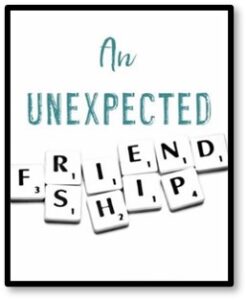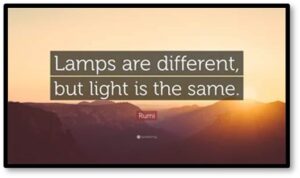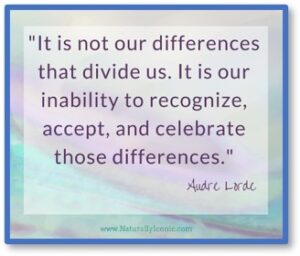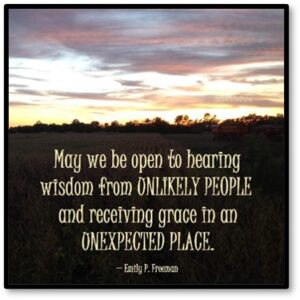Monday Author: Susanne Skinner
 One day last year my doorbell rings and there stands Eva on the other side. Eva is a Jehovah’s Witness. She introduces herself and says she wants to share her faith with me.
One day last year my doorbell rings and there stands Eva on the other side. Eva is a Jehovah’s Witness. She introduces herself and says she wants to share her faith with me.
Most of us have experienced this. They walk through neighborhoods, often in groups, knocking on doors and leaving pamphlets. The free exercise of religion is their right, just as it is our right to not answer or ask them to leave.
I intend to politely say I’m not interested, but she is very gracious and I want to return her kindness. I take the time to explain that my beliefs are different and thank her for stopping by.
A Strange Beginning
Part of the Jehovah’s ministry is door to door because it is based on the model Jesus gave the Christian church and because early Christians spread the Gospel by going from house to house.
I know almost nothing about Jehovah’s Witnesses. Eva explains some of the doctrine and I recognize similarities in mainstream religions. A discussion ensues that grows more and more interesting. She does not attempt to convert or discredit my beliefs. Instead, she shares her own in simple and sincere dialog.
Curiosity keeps me there, and we end up chatting for 15 minutes. She is young—we have daughters her age—and I find myself enjoying our conversation. Eva is neither demanding nor zealous in her approach.
She leaves me some literature (a requirement, though I do not have to take it) and we say good-bye. A week later I receive a thank-you note, expressing appreciation for our conversation and my willingness to talk with her. “So many people close their doors, and you opened yours.” I am touched by her words.
Different and Similar
Although there are clear differences (and this isn’t a religious post or theology lesson) I learn that for Jehovah’s witnesses, there is only one God, and that’s Jehovah. Christians believe in the Holy Trinity: God as the father, the son (Jesus Christ), and the Holy Spirit. There are many more but this offers us common ground for an interesting discussion. She knows her scripture front to back!
 I find myself liking Eva, and she stops by twice more before Covid-19 begins to shut down social contact. We sit outside and chat about a variety of things; she never stays more than 15 minutes. Not once does her discussion undermine my faith. We enjoy finding common ground to enhance our discussion; saying we are the same, just different.
I find myself liking Eva, and she stops by twice more before Covid-19 begins to shut down social contact. We sit outside and chat about a variety of things; she never stays more than 15 minutes. Not once does her discussion undermine my faith. We enjoy finding common ground to enhance our discussion; saying we are the same, just different.
In our conversations we find similarities in core beliefs. Theology intrigues me and she is well versed in her beliefs. We exchange views on current affairs, cooking, and even what it’s like to move from New England to Florida. We both keep an open mind and are surprised when we discover shared connections. After each visit, I receive a thank-you note, until Covid-19 brings her visits to an end.
And So, a Friendship Begins
The virus escalates and we become home bound. One day I receive a card telling me she misses our conversations and hopes I am doing well. Her door-to-door ministry is on hold. She struggles with isolation and is fearful of the virus, wondering how I am coping.
I send a note back, assuring her that in time things will return to normal. I offer encouragement and share my baking and craft projects for the week. I include a quote from Thich Nhat Hanh,
“Hope is important because it can make the present moment less difficult to bear. If we believe that tomorrow will be better, we can bear a hardship today.”
And so, a friendship begins. A regular exchange of note cards (never letters) between us. Eva closing hers with scripture and a prayer for continued wellness, mine with a quote offering encouragement and inspiration. She writes a note on the outside of her envelopes that reads. “sealed with a wet paper towel.”
Pandemic Pen Pals
 I look forward to receiving Eva’s notes—we’ve become pen pals in a time of forced isolation. We exchange correspondence each month until November when I travel to Maine.
I look forward to receiving Eva’s notes—we’ve become pen pals in a time of forced isolation. We exchange correspondence each month until November when I travel to Maine.
I plan to be gone a week but end up staying for six as my father’s health falls into a steep decline. Instead of celebrating his birthday, we celebrate a life well lived when he passes away. My everyday life is suspended as I deal with his death.
When I return home I find several notes from Eva, the last one expressing concern that she has not heard from me. She asks if I am okay, then wonders if I no longer wish to correspond with her. Reading her notes lift my spirits and I respond, explaining my absence and sharing my sadness. By now, I am talking to a friend.
Difference Does Not Mean Division
 We have different religious beliefs (including death), but this does not divide us. She is most concerned with my emotional well-being. I shared stories about my Dad with her, and she understands my grief. Once again, her words are simple and sincere and I am grateful for her outreach and sympathy.
We have different religious beliefs (including death), but this does not divide us. She is most concerned with my emotional well-being. I shared stories about my Dad with her, and she understands my grief. Once again, her words are simple and sincere and I am grateful for her outreach and sympathy.
Not long afterward, I am diagnosed with Covid-19. It happens over Christmas, a holiday not celebrated by Jehovah’s Witnesses. Knowing I celebrate it, she extends greetings and upon learning I am ill, immediately drops a get-well note in our mailbox.
Unexpected Life Lessons
 Eva is one of my life lessons. Happenstance, coupled with her desire to fulfill the requirements of her faith, led her to my door. Wanting to be polite (it was obvious I was home) I answered her knock.
Eva is one of my life lessons. Happenstance, coupled with her desire to fulfill the requirements of her faith, led her to my door. Wanting to be polite (it was obvious I was home) I answered her knock.
And therein lies the gift. When we are offered an opportunity to understand what makes us different, we also discover and celebrate commonality. Life’s most important lessons don’t always come from a doctrine or a higher education. Sometimes they come from unexpected places, especially if we are willing to open the door.
